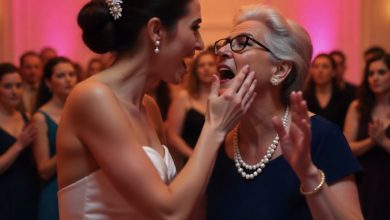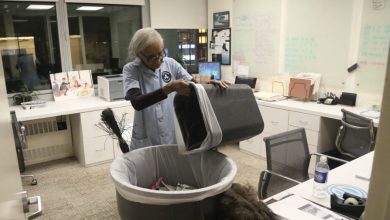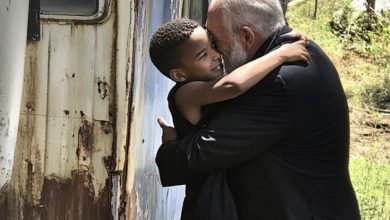“They Forced Me to Let My Sister Take My Award — But My Graduation Speech Exposed Everything”

The air inside the university auditorium was thick and heavy, as if the summer heat had seeped into the very walls. The hall was enormous, its high ceilings echoing the buzz of excitement from hundreds of families waiting for the graduation ceremony to begin. Flowers were wilting under the stage lights, their scent mixing with the smell of polished wood and perfume. For most people, this was a day of pride and joy. For me, it was supposed to be the same — my day, my reward after four long, exhausting years of hard work. I, Anna, had earned the title of Valedictorian. But to my parents, this moment wasn’t about me at all. It was another chance to glorify my younger sister, Maya.
My parents had always seen Maya as the shining star of the family. She was beautiful, popular, and had a natural charm that drew people in without effort. I was the opposite — quiet, serious, always lost in books and ideas. I brought home certificates, awards, and scholarships, but my achievements were met with polite smiles and dismissive comments. “That’s nice, Anna,” my mother would say, before turning her full attention to Maya’s latest dance recital or beauty pageant. My father often joked that my trophies couldn’t pay the bills or make people like us. I learned early on that, in my family, success only mattered if it could be shown off at dinner parties.
Now, backstage at the graduation hall, I stood in my black gown and gold stole, adjusting the Valedictorian sash that represented every sleepless night and every ounce of effort I had poured into my studies. Just as I was about to take a deep breath and walk toward the stage, my parents appeared behind me. Their expressions were serious, almost businesslike. I had no idea that the conversation that followed would change everything.
“Anna,” my father began, his tone sharp, as if he were discussing a financial deal instead of my future. “We need to talk about the ceremony.”
I turned to face him. “What about it?”
He glanced at my mother, who nodded for him to continue. “We’ve decided that Maya should go on stage in your place.”
For a moment, I thought I had misheard him. “What are you talking about?”
He folded his arms, his eyes narrowing as if daring me to question him. “Let Maya walk across the stage and accept the Valedictorian award. She’ll give your speech — the one you wrote. Nobody will know the difference. She needs this recognition, Anna. She’s been struggling to find a job, and this will look incredible on her résumé.”
The words hit me like a slap. I stared at them, stunned, my mind struggling to make sense of what I’d just heard. They weren’t asking. They were telling me — demanding that I surrender the achievement that had defined my entire college journey. My throat tightened.
“No,” I said quietly, my voice trembling but firm. “This is my honor. I earned it.”
My father’s face twisted with rage. His voice rose so suddenly that several students nearby turned to stare. “I PAID for your education, Anna! Every cent! You think you did this alone? Without me, you’d have nothing! You owe this family — you owe your sister!”
I could have cried, but instead, I felt something inside me harden. I had spent years enduring their favoritism, their manipulation, their endless reminders that I was nothing without their money. But this — this was too much. They weren’t just taking credit for my success; they were trying to erase me completely.
I met my father’s furious eyes and said nothing. Instead, I smiled — not out of joy, but from the cold, clear understanding of what I needed to do. They wanted to use my success to feed their pride. But I was going to show them something much stronger than pride — truth.
The announcement echoed through the hall:
“Ladies and gentlemen, please welcome our Valedictorian — Anna Williams.”
Applause erupted as I stepped onto the stage. The bright lights were blinding for a moment, and I could feel my pulse pounding in my ears. I stood behind the wooden podium, facing a sea of faces — classmates, professors, families — and somewhere among them, my parents and Maya, watching with smug satisfaction. They probably thought I would cave in. They probably believed I’d stay silent and play the obedient daughter.
I started the speech exactly as they expected. My voice was calm, polished, every word clear and measured. I spoke about dreams, resilience, and the future. I thanked the university, the professors, and the families who had supported us. I could feel my parents relaxing, their earlier anger melting into triumph. But as I neared the end, I paused. The silence that followed was deep enough to hear my own heartbeat.
“And finally,” I said, letting my voice carry through the vast room, “I want to thank the person who truly made this day possible — the one who paid for my education and taught me what sacrifice really means.”
A murmur swept through the audience. Everyone expected the obvious. They thought I was about to thank my father. I looked straight into the camera broadcasting the ceremony live, then back toward the crowd.
“My father once told me that I owed him for everything. That I should be grateful because he paid for my education.”
I stopped, watching as my parents’ smiles froze in place. “But that’s not true.”
The crowd shifted uncomfortably. I could feel the air tighten.
“The truth,” I continued, my voice firm and calm, “is that my father paid for only ten percent of my tuition. The remaining ninety percent was covered by the Vance Foundation — a full academic scholarship I earned through my own hard work and integrity.”
The whispers began instantly. My parents’ faces went pale. They hadn’t known. I had never told them.
“I kept it a secret,” I said, my eyes on them now, “because I knew that the moment they found out, they would find a way to use it — to claim it as their victory. I wanted something that was mine alone. Something pure.”
I took a deep breath, the weight of four years finally lifting. “The Vance Foundation scholarship wasn’t just generous. It was life-changing. It even provided additional funds that I didn’t need. And do you know what I did with those extra funds?”
I could see my mother shaking her head slightly, her lips parted in confusion and fear.
“I used that money to pay off a large portion of my father’s company debt — the mortgage that was about to destroy our family business. Quietly. Anonymously. Because despite everything, I still loved my family enough to save them.”
Gasps filled the hall. My parents sat motionless, unable to hide the horror on their faces.
“But I didn’t stop there,” I said, my tone steady. “When I made that payment, I added one very important condition to the agreement. A clause that stated the debt forgiveness would become void if my reputation, my honor, or my academic achievements were ever publicly disrespected by the recipients of that help.”
The hall went completely silent. Even the Dean looked stunned.
I turned directly toward my parents. My voice was no longer calm — it was resolute, sharp, final.
“Just before this ceremony, you demanded that I give up my title to Maya. You shouted at me. You called me ungrateful. You accused me of owing you. In that moment, you violated that agreement.”
I let that sink in, my words echoing through the room.
“As of right now,” I said, “the clause has been triggered. The debt forgiveness is canceled. You are once again fully responsible for the business loan — with interest.”
I didn’t need to raise my voice. The truth did the work for me. My parents looked like statues carved from disbelief and humiliation. The crowd sat frozen. Every student, every professor, every parent was watching the same quiet destruction of a lie.
I lowered my notes, folded them neatly, and placed them on the podium.
“My father once said I owed this family everything,” I said softly. “But what he failed to understand is that honor and intelligence are not debts. They are gifts — gifts that must be respected, not stolen.”
Then, without another word, I stepped away from the microphone.
The sound that followed was like a storm — half gasps, half applause. It grew louder with every step I took down the stage. My classmates stood, some cheering, others simply staring in disbelief. But I didn’t look back. I didn’t need to. I walked straight down the center aisle, my Valedictorian sash draped across my shoulder like armor.
Outside, sunlight streamed through the tall glass doors, warm and blinding after the darkness of the hall. I stepped out into it and took a deep breath. For the first time in my life, I felt free — not from responsibility or family, but from the invisible weight of their control.
My parents had always taught me that love was conditional. That it had to be earned through obedience and sacrifice. But in trying to control me, they had created the very person who would never let them. They had taught me the language of debt — and I had rewritten it in the language of dignity.
I walked across the courtyard, hearing faint echoes of my classmates still celebrating behind me. My phone buzzed with dozens of messages, some from students congratulating me, others expressing disbelief at what had just happened live on the university’s broadcast stream. I ignored them. I didn’t need validation. I had already proven everything I needed to.
Later that evening, as I sat in my dorm room, still wearing my gown, I thought about what had happened. I felt no guilt. Only peace. My parents would face the consequences of their choices — not out of vengeance, but justice. For once, the truth had been louder than their pride.
I looked out the window at the sunset, its golden light spilling across the campus where I had spent the last four years building my future.
For so long, I had believed that success meant earning their approval. Now I understood: success meant owning my story — every hardship, every triumph, every truth they had tried to bury.
They wanted me to step aside.
Instead, I stepped forward.
And in doing so, I finally became everything they had tried to prevent me from being — independent, unafraid, and free.










